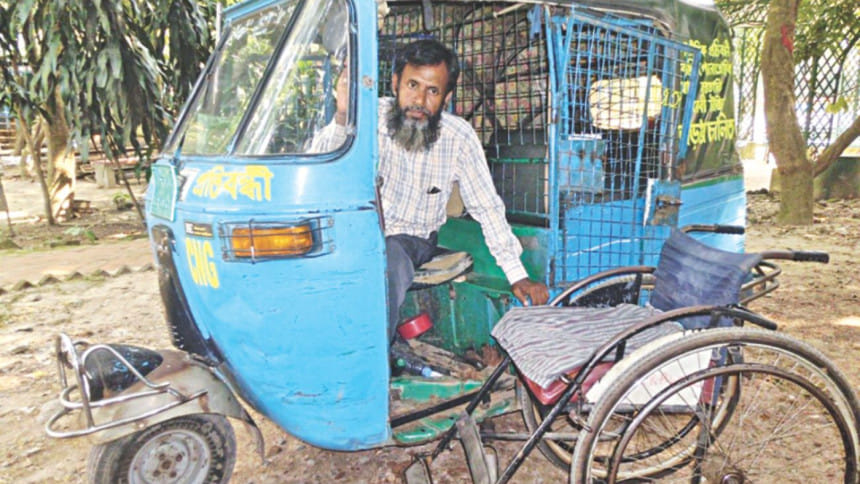A driver without use of legs

Not easily in Bangladesh.
"For a man in wheelchair doing work is a sort of problem but the main setback is the social barrier," declared Riaz. "I cannot work like others but I can do it differently; the society does not recognise me as an able person because of my body."
This is the essence of the experiences Riazur Rahman gathered in the last five years as a licensed auto-rickshaw driver. It took a great deal of trouble. He had to face legal complexities, wait for months, and have a minister's recommendation to get the licence.
In 2006, the father of four suffered serious injuries in the spinal cord when he met with a road accident near Kanchpur Bridge in Narayanganj where he lives.
He was rushed to Narayanganj General Hospital and then to Dhaka Medical College Hospital for treatment. Finally he went to the Centre for the Rehabilitation of the Paralysed (CRP) in Savar.
After fours years of treatment and therapy when his condition improved, the CRP authorities asked him what he wanted to do for a living.
"When sister (CRP founder Valerie Taylor) asked me what I wanted to do, I said I drove an auto-rickshaw for two years without licence before the accident," said Riaz.
"Then the CRP authority started raising fund," he said.
With the help of the British Society of Rehabilitation Medicine and Nurses from Perth Western Australia, CRP bought him an auto-rickshaw for Tk 3.6 lakh in early 2010 and turned it into a hand control vehicle.
"It was a simple modification -- generally auto-rickshaws use right-foot braking; we just turned it into a hand control brake," said CRP advocacy and networking officer Md Masud Rana.
When all was set, getting the licence became the main barrier, said Riaz. "BRTA did not allow me to take the driving test because I'm paralysed below the waist. I could not drive the auto-rickshaw for more than six months due to the licensing problem," he said.
"On behalf of me, CRP [staff] hopped from office to office. Finally the social welfare minister [Enamul Haq Mostafa Shahid] took it upon himself, and I got the licence through a test."
Md Mohsin Hossain, an assistant director of the Bangladesh Road Transport Authority (BRTA), said as far as he knew Riaz was the first man with disability to have a professional driving licence.
The only bread earner of his six-member family, Riaz makes Tk 700 to Tk 800 on average daily.
"I don't need legs for driving; hands are enough," said a confident Riaz, who wants to keep investing for the education of his all children, the eldest an eleventh grader.
CRP official Masud Rana said, "In many countries, people in wheelchairs are driving vehicles but in our country because of the licensing problem, they don't get the opportunity."
"I know people who do not have licences but are driving for years," he said, calling for relaxing the licensing rules.
The BRTA official, Mohsin Hossain, said people with disabilities were not allowed to get the driving licence because of some conditions in the BRAT ordinance.
One condition in the medical certificate application says, "Has the applicant any deformity or loss of members which would interfere with the efficient performance of his duties as a driver." But what still grieves Riaz is that police often stop him although he has a licence.

 For all latest news, follow The Daily Star's Google News channel.
For all latest news, follow The Daily Star's Google News channel. 



Comments